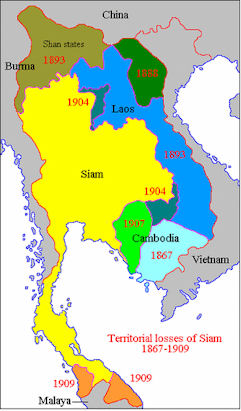

Zitierweise / cite as:
Payer, Alois <1944 - >: Chronik Thailands = กาลานุกรมสยามประเทศไทย. -- Chronik 2007 / B. E. 2550. -- 1. undatiert. -- Fassung vom 2017-03-21. -- URL: http://www.payer.de/thailandchronik/chronik2007a.htm
Erstmals publiziert: 2012-11-09
Überarbeitungen: 2017-03-21 [Ergänzungen] ; 2016-12-31 [Ergänzungen] ; 2016-08-15 [Ergänzungen] ; 2016-04-18 [Ergänzungen] ; 2016-03-17 [Ergänzungen] ; 2016-02-11 [Ergänzungen] ; 2016-01-18 [Ergänzungen] ; 2016-01-07 [Ergänzungen] ; 2015-05-25 [Ergänzungen] ; 2015-01-17 [Ergänzungen] ; 2014-11-04 [Ergänzungen] ; 2014-10-13 [Ergänzungen] ; 2014-09-24 [Ergänzungen] ; 2014-09-09 [Ergänzungen] ; 2014-04-02 [Ergänzungen] ; 2013-05-02 [Ergänzungen] ; 2013-04-25 [Ergänzungen und Teilung des Jahrgangs]; 2013-04-21 [Ergänzungen]; 2013-04-09 [Ergänzungen]; 2013-04-03 [Ergänzungen]; 2013-03-27 [Ergänzungen]; 2013-03-17 [Ergänzungen]; 2013-03-09 [Ergänzungen]; 2013-02-27 [Ergänzungen]; 2013-02-22 [Ergänzungen]; 2013-02-17 [Ergänzungen]; 2013-02-16 [Ergänzungen]; 2013-02-05 [Ergänzungen]; 2013-01-26 [Ergänzungen]; 2013-01-13 [Ergänzungen]; 2012-11-13 [Verbesserungen]
©opyright: Dieser Text steht der Allgemeinheit zur Verfügung. Eine Verwertung in Publikationen, die über übliche Zitate hinausgeht, bedarf der ausdrücklichen Genehmigung des Herausgebers.
Dieser Text ist Teil der Abteilung
Thailand von
Tüpfli's Global Village Library
ช้างตายทั้งตัวเอาใบบัวปิดไม่มิด
|
Gewidmet meiner lieben Frau Margarete Payer die seit unserem ersten Besuch in Thailand 1974 mit mir die Liebe zu den und die Sorge um die Bewohner Thailands teilt. |
|
Bei thailändischen Statistiken muss man mit allen Fehlerquellen rechnen, die in folgendem Werk beschrieben sind:
Die Statistikdiagramme geben also meistens eher qualitative als korrekte quantitative Beziehungen wieder.
|
| Statistik: Geschätzte Anzahl der Schusswaffen in Privatbesitz: 10 Mio. Davon registriert: 3,9 Mio. Müll des Industriegebiets Maptaphut (นิคมอุตสาหกรรมมาบตาพุด): 558.000 Tonnen, davon sind 31% Schadstoffe |
1998 - 2007
Durchschnittliche Verschuldung eines Haushalts
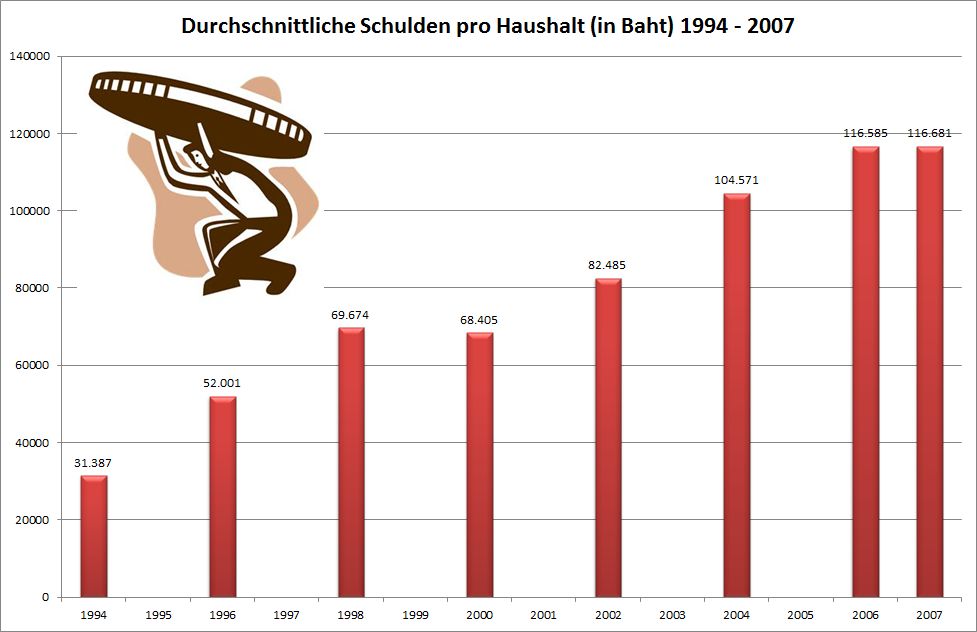
Abb.:
Durchschnittliche Verschuldung eines Haushalts (in Baht) 1994 - 2007
[Datenquelle: Thailand in figures 2012-2013. -- Vol. 1. -- ISBN
978-616-7256-11-9. -- S. 543]
2000 - 2007
Bruttosozialprodukt der Provinzen Chiang Rai (เชียงราย) und Chiang Mai (เชียงใหม่):
Abb.: Lage der Provinzen Chiang Mai (เชียงใหม่) und Chiang Rai (เชียงราย)
[Bildquelle: CIA. -- Public domain]
Abb.: Bruttosozialprodukt der Provinz Chiang Rai (เชียงราย) (in Milliarden Baht), 2000 - 2007
[Datenquelle: Thein Swe / Chambers (2011), S. 143]
Abb.: Bruttosozialprodukt der Provinz Chiang Mai (เชียงใหม่) (in Milliarden Baht), 2000 - 2007
[Datenquelle: Thein Swe / Chambers (2011), S. 144]
Abb.: Bruttosozialprodukt pro Kopf (in Tausend Baht) der Provinzen Chiang Mai (เชียงใหม่) und Chiang Rai (เชียงราย), 2000 - 2007
[Datenquelle: Thein Swe / Chambers (2011), S. 143f.]
1980 - 2010
Auslandsschulden des Staats:
Abb.: Auslands-Staatsschulden (in Milliarden US-$); 1980 - 2010
[Datenquelle: Bank of Thailand]
1995 - 2011

Außenhandel mit Japan:
Abb.: Lage von Japan
[Bildquelle: OpenStreetMap. -- Creative Commons Lizenz (Namensnennung, share alike)]
Abb.: Außenhandel mit Japan 1995 - 2011
[Datenquelle: Bank of Thailand]
1995 - 2011

Außenhandel mit den USA:
Abb.: Außenhandel mit den USA 1995 - 2011
[Datenquelle: Bank of Thailand]
2007
Es erscheint:
National sexual behavious survey of Thailand 2006 / Aphichat Chamratrithirong [อภิชาติ จํารัสฤทธิรงค์] [u.a.]. -- Nakhon Pathom : Institute for Population and Social Research, Mahidol University, 2007. -- 109 S. : Ill. -- (Publication / Institute for Population and Social Research, Mahidol University ; 338). -- ISBN 978-974-11-0876-3. -- Online: http://www.ipsr.mahidol.ac.th/ipsr/BookDetail/Download/National%20Sexual%20Behavior%20Survey%20of%20Thailand%202006.pdf. -- Zugriff am 2014-04-02]
--
Abb.: Einbandtitel
Abb.: Durchschnittsalter beim ersten Sexualverkehr
[Datenquelle: a.a.O., S. 59f.]
Abb.: Prozentzahl der Männer, die schon Geschlechtsverkehr mit einer Prostituierten hatten
[Datenquelle: a.a.O., S. 64]
Abb.: Prozentzahl der Männer, die beim letzten Geschlechtsverkehr mit ... ein Kondom benutzten
[Datenquelle: a.a.O., S. 65f.]
Abb.: Prozentsatz der Thais, die mindestens einmal im Monat Alkohol trinken, 2006
[Datenquelle: a.a.O., S. 93]
Abb.: Prozentsatz derer, die zugeben, in den letzten 12 Monaten Drogen genutzt zu haben, 2006
[Datenquelle: a.a.O., S. 95]
2007
Transgender Women of Thailand (ผู้หญิงข้ามเพศ) macht Lobbying, dass Kathoey (กะเทย, Transsexuelle) die Bezeichnung นางสาว ("Fräulein") statt นาย ("Herr") auf ihren Identitätsausweisen bekommen.
2007

Es erscheint:
Amporn Marddent [อัมพร หมาดเด็
น ]: Sexual culture among young migrant Muslims in Bangkok. -- Chiang Mai : Silkworm Books, 2007. -- 79 S. ; 22 cm. -- (Islam in Southeast Asia : views from within). -- ISBN 978-074-9511-06-0
Abb.: Prof. Amporn Marddent [อัมพร หมาดเด็น ]
[Bildquelle: http://202.28.68.27/des/html/source/DESAboutPersonallist_.php?PERSONID=4800000041. -- Zugriff am 2014-08-27. -- Fair use]Die Verfasserin - eine Muslimin - berichtet darin über sexuelle Einstellungen und sexuelles Verhalten junger Muslime in der muslimischen Gemeinschaft Ramkhamhaeng Road (ถนนรามคำแหง) (Thung Bangkapi - ทุ่งบางกะปิ)aufgrund von Interviews zwischen 2003-12 und 2004-03.
Thung Bangkapi (ทุ่งบางกะปิ), heute meist Ram (ราม) genannt, ist ein altes Siedlungsgebiet für Muslime: ursprünglich Muslime aus dem Sultanat Patani (كراجأن ڤتتاني), die als Kriegssklaven die Khlongs (คลอง) Bangkoks ausheben mussten. Heute wohnen dort viele junge muslimische Zuwanderer, während die alteingesessenen Muslime oft nach Min Buri (มีนบุรี), Nong Chok (หนองจอก) und einige Gebiete der Provinz Ayutthaya (พระนครศรีอยุธยา) weggewandert sind.
Abb.: Lage von Thung Bangkapi (ทุ่งบางกะปิ) (6), Nong Chok (หนองจอก) (3) und Min Buri (มีนบุรี) (10)
[Bildquelle: Hdamm / Wikimedia. -- Creative Commons Lizenz (Namensnennung, share alike)]
Abb.: Lage der Ramkhamhaeng Road (ถนนรามคำแหง)
[Bildquelle: OpenStreetMap. -- Creative Commons Lizenz (Namensnennung, share alike)]Ein Muslim-Aktivist teilt die muslimische Jugend in zwei Gruppen:
กลุ่มเคร่งครัดและรักเรียน - die Gruppe derer, die ernsthaft (religiös) sind und gerne lernen
พวกเด็กใจแตก - die Gruppe der Jugendlichen mit verdorbenem Herzen (die der modernen Jugendkultur folgen)
Dies entspricht der Unterscheidung in der Thai-Gesellschaft zwischen:
เด็กเรียน - lernende Jugendliche (aber mit dem spezifisch muslimischen Zusatz: เคร่งครัด - ernsthaft religiös)
เด็กเกเร - unartige Jugendliche
Ein älterer Muslim beschreibt die พวกเด็กใจแตก - die Gruppe der Jugendlichen mit verdorbenem Herzen - so:
"I saw many of them hold hands when they walked together and some hugged each other. It’s not good for them to do that in public, especially those girls because their clothing shows who they are. Otherwise, they should take the hijab [حجاب] [ฮิญาบ] off if they want to do that. You know, after praying the subh [the morning or dawn prayer time = fajr - فجر] and at nighttime, many young couples including Muslims are at the indoor sports complex (the Indoor Stadium, Huamark [อินดอร์ สเตเดียม หัวหมาก]). They not only hug but also kiss on the cheek and mouth." [Quelle: Amporn Marddent [อัมพร หมาดเด็
น ]: Sexual culture among young migrant Muslims in Bangkok. -- Chiang Mai : Silkworm Books, 2007. -- 79 S. ; 22 cm. -- (Islam in Southeast Asia : views from within). -- ISBN 978-074-9511-06-0. -- S. 36f.]
Abb.: Kopfbedeckung hijab [حجاب] [ฮิญาบ], Südthailand, 2008
[Bildquelle: Tarik Abdel-Monem. -- http://www.flickr.com/photos/tarikabdelmonem/2201134998/. -- Zugriff am 2014-08-28. -- Creative Commons Lizenz (Namensnennung, keine kommerzielle Nutzung, share alike)]
Abb.: Lage des Indoor Stadium, Huamark [อินดอร์ สเตเดียม หัวหมาก]
[Bildquelle: OpenStreetMap. -- Creative Commons Lizenz (Namensnennung, share alike)]
Abb.: Indoor Stadium, Huamark [อินดอร์ สเตเดียม หัวหมาก], 2012
[Bildquelle: www.thai-fussball.com / Wikimedia. -- GNU FDLicense]Junge weibliche Musliminnen tragen zwar oft das Kopftuch [hijab - حجاب / ฮิญาบ], aber enge Blusen und Hosen. Manche tragen sogar sai diao (สายเดี่ยว; schulterfreie Bluse mit schmalen Trägern), wenn sie zur Unterhaltung und Shoppen nach RCA (อาร์ซีเอ - Royal City Avenue) und Siam Square (สยามสแควร์) gehen
Abb.: sai diao (สายเดี่ยว), Bangkok, 2009
[Bildquelle: Ian Fuller. -- http://www.flickr.com/photos/ianfuller/3332680383. -- Zugriff am 2014-08-28. -- Creative Commons Lizenz (Namensnennung, keine kommerzielle Nutzung)]
Abb.: Lage der RCA (อาร์ซีเอ)
[Bildquelle: OpenStreetMap. -- Creative Commons Lizenz (Namensnennung, share alike)]
Abb.: Lage von Siam Square (สยามสแควร์)
[Bildquelle: OpenStreetMap. -- Creative Commons Lizenz (Namensnennung, share alike)´]Ein älterer Islam-Gelehrter:
"Ninety percent of Muslim male youths in this area have used drugs—by drugs I mean cigarettes, beer, and ya kae [ ยาแก้ - cough syrup mixed with Coca-Cola]. The last kind of drug is popular among the Malay ethnic youth group. It’s easy to find and also available in many places here. We cannot deny that a few young Muslim women here are sex workers. They were recruited to this work because of poverty." [Quelle: Amporn Marddent [อัมพร หมาดเด็
น ]: Sexual culture among young migrant Muslims in Bangkok. -- Chiang Mai : Silkworm Books, 2007. -- 79 S. ; 22 cm. -- (Islam in Southeast Asia : views from within). -- ISBN 978-074-9511-06-0. -- S. 37.]Die Studie zeigte, dass das erotisch-sexuelle Verhalten der jungen Muslime sich dem Mainstream anpasst. So ist Kik/Gik (กิ๊ก) verbreitet: Kik ist jemand, der mehr als ein Kumpel ist, aber kein dauerhafter Sexualpartner. Sex ist nicht nötig, um ein Kik zu sein. Longdo dictionary definiert: "hide lover, part time lover, The complicate relation, not serious in relation, short relation". Wenn ein Mann viele Kik hat, gilt das als modern. Wenn eine Frau viele Kik hat, gilt das als minderwertig, da sie keine Männer abweisen kann, ein zu unreifes und weiches Herz (ใจอ่อน)hat.
Auch bei männlichen muslimischen Studenten gibt es die Initiation (ขึ้นครู - dem Lehrer Respekt erweisen 0 erste Lektion = erste Lektion in Sex), bei der sie von älteren Studenten in ein Bordell gebracht werden. Wie weit diese Sitte bei Muslimen verbreitet ist, konnte die Studie nicht ermitteln.
Manche Nichtmuslime bevorzugen muslimische Mädchen, weil sie denken, dass Mädchen, die ein Kopftuch (hijab [حجاب] [ฮิญาบ]) tragen, Jungfrauen sind.
Muslime dagegen haben gerne Nicht-Musliminnen als Freundinnen (faen - แฟน), um Sex zu haben, sie heiraten dann aber muslimische Jungfrauen. Dass man mehrere Faen hat (แฟน) sieht man durch die Erlaubnis der Polygamie im Islam gerechtfertigt.
Auch unter den Muslimen gibt es Kathoey (กะเทย, Transsexuelle), Ihre Partner sind meist Nicht-Muslime. Ein junger muslimischer Kathoey sagt:
"I’m not both male and/or female. In Bahasa Melayu [Malay language], people call me ‘por-nae.’ I’m a man biologically but I behave like a woman. I have sexual feelings towards men much more than towards women. I am ‘both-gay’ maybe. My partner is now working. He is a non-Muslim but there are no problems concerning our different beliefs ... There are four kinds of gay which are 'gay king [เกย์คิง],’ ‘gay queen [เกย์ควีน] ,’ ‘bai-gay’ [ไบเกย์]or ‘beua bai’ [bisexual] [เสือไบ ("Bi-Tiger")], and ‘both-gay’... Oh! I’m not 100 percent gay. I am a kathoey [กะเทย
] finally."[Quelle: Amporn Marddent [อัมพร หมาดเด็
น ]: Sexual culture among young migrant Muslims in Bangkok. -- Chiang Mai : Silkworm Books, 2007. -- 79 S. ; 22 cm. -- (Islam in Southeast Asia : views from within). -- ISBN 978-074-9511-06-0. -- S. 44.]Ein anderer muslimischer Kathoey sagt:
"It’s very liberating to do anything outside of the Muslim community. But I have to act like a man when I go home or to the mosques. I felt uncomfortable acting out my identity in a way that contradicts my feelings. I cannot give up this identity ... however; my praying position is that of a man." [Quelle: Amporn Marddent [อัมพร หมาดเด็
น ]: Sexual culture among young migrant Muslims in Bangkok. -- Chiang Mai : Silkworm Books, 2007. -- 79 S. ; 22 cm. -- (Islam in Southeast Asia : views from within). -- ISBN 978-074-9511-06-0. -- S. 45.]Die meisten Muslime sind homophob und ganz besonders gegen Kathoey (กะเทย, Transsexuelle). Typisch sind folgende Aussagen junger heterosexueller Muslime:
"I hate kathoey [กะเทย, Transsexuelle] and phuak bai [พวกไบ - Bisexuelle]. They are not completely male and they ‘sia chat koet' [forsake their male birthright] [เสียชาติเกิด]"
"The third sex is common in Thai society, but I cannot accept them as friends, particularly Muslims. They look like beasts. The third sex is kau Nabi Luth [people of Sodom] and I define them as an-nar [people of hell]." [Quelle: Amporn Marddent [อัมพร หมาดเด็
น ]: Sexual culture among young migrant Muslims in Bangkok. -- Chiang Mai : Silkworm Books, 2007. -- 79 S. ; 22 cm. -- (Islam in Southeast Asia : views from within). -- ISBN 978-074-9511-06-0. -- S. 46f.]Eine junge muslimische Frau:
"It is a profound mistake, especially since humans are not homosexual by nature, so they are pseudo people ... For me, if they are growing up with hermaphrodites, it is okay. How unfortunate they are. I pity them." [Quelle: Amporn Marddent [อัมพร หมาดเด็
น ]: Sexual culture among young migrant Muslims in Bangkok. -- Chiang Mai : Silkworm Books, 2007. -- 79 S. ; 22 cm. -- (Islam in Southeast Asia : views from within). -- ISBN 978-074-9511-06-0. -- S. 47.]Als Aufklärungsbuch für Neuverheiratete gibt es หลังเที่ยงคืน : ศาสตร์แห่งหลักธรรมะ ("Nach Mitternacht´: Lehrbuch der Moral")
Abb.: EinbandtitelJunge männliche Muslime über dieses Buch:
"I don’t know why Lang Thiang Khuen [a popular Thai Islamic book on sexual ethics in Islam] is not available in general bookstores. I have never been to the Islamic Center [of Thailand]. If such a book is distributed to the other bookstores, people will know more about it. I am also ashamed to talk about sexuality with my parents and Muslim scholars." "I have never read Lang Thiang Khuen. But I’m a fan of Sepsom Bo Mi Som [a Daily News column by a Thai medical doctor focusing on sexual problems]. I have written letters asking the columnist about homosexuality, masturbation, and sexually transmitted diseases."
"I didn’t read version 1 of Lang Thiang Khuen, but I jumped into version 2. It’s a good book that talks about what newly married people do, and the meaning of family in Islam. I also read some other books related to Islamic sexuality and family life, but Islamic materials concerning this issue are limited in Thailand."
[Quelle: Amporn Marddent [อัมพร หมาดเด็
น ]: Sexual culture among young migrant Muslims in Bangkok. -- Chiang Mai : Silkworm Books, 2007. -- 79 S. ; 22 cm. -- (Islam in Southeast Asia : views from within). -- ISBN 978-074-9511-06-0. -- S. 48.]Ein großer Teil der jungen Muslime meint, dass Männer ihren Sexualtrieb ablassen müssen, vor allem durch Selbstbefriedigung. Von Frauen dagegen glauben sie, dass deren Sexualtrieb nicht so stark ist, und Frauen sich deshalb beherrschen sollen (d.h. sich nicht selbst befriedigen). eine junge Muslimin:
"I have never masturbated. I can control [sexual desire] better than my boyfriend. I have to help him because I love him. I feel bad to see him try to control his desire; it’s quite difficult for him. He taught me how to do it. But, he mostly helps himself. It is natural for men." [Quelle: Amporn Marddent [อัมพร หมาดเด็
น ]: Sexual culture among young migrant Muslims in Bangkok. -- Chiang Mai : Silkworm Books, 2007. -- 79 S. ; 22 cm. -- (Islam in Southeast Asia : views from within). -- ISBN 978-074-9511-06-0. -- S. 50.]Jungfräulichkeit der Frau wird hoch geschätzt. Eine junge Muslimin:
"Virginity is very important for me and every woman has to keep it until the wedding day, because it can only be given once, and men want to take it. To be girl- and boyfriends does not mean that they are going to marry or be husband and wife." [Quelle: Amporn Marddent [อัมพร หมาดเด็
น ]: Sexual culture among young migrant Muslims in Bangkok. -- Chiang Mai : Silkworm Books, 2007. -- 79 S. ; 22 cm. -- (Islam in Southeast Asia : views from within). -- ISBN 978-074-9511-06-0. -- S. 54.]Obwohl Nikāḥ al-Mutʿah (نكاح المتعة) nur bei Schiiten anerkannt ist, bei Sunniten aber völlig verboten ist, und die meisten Muslime Thailands Sunniten sind, wird nikah praktiziert.
"Zeitehe, Genussehe, Mutʿa-Ehe (arabisch نكاح المتعة , DMG nikāḥ al-mutʿa, wörtlich „Ehe des Genusses“) oder Sighe-Ehe (persisch صيغه ṣīġeh) bezeichnet eine zeitlich begrenzte Ehe, die bei schiitischen Muslimen erlaubt ist. Bei einer Zeitehe „heiratet“ ein muslimischer Mann eine Frau für eine Zeitdauer von einer halben Stunde bis zu 99 Jahren." [Quelle: http://de.wikipedia.org/wiki/Zeitehe. -- Zugriff am 2014-08-28]
Eine junge Muslimin:
"Many of them live together before nikah . . . many have married but their parents don’t know that their daughters [have entered] nikah. I don’t agree with this practice. Nowadays it is very easy to contact our parents, just call them and let them know. And I totally don’t agree with the mut‘ah, it is not the correct path for marriage in Islam." [Quelle: Amporn Marddent [อัมพร หมาดเด็
น ]: Sexual culture among young migrant Muslims in Bangkok. -- Chiang Mai : Silkworm Books, 2007. -- 79 S. ; 22 cm. -- (Islam in Southeast Asia : views from within). -- ISBN 978-074-9511-06-0. -- S. 57.]Vorehelicher Geschlechtsverkehr von Paaren nimmt auch bei jungen Muslimen zu. Eine junge Muslimin:
"I’ve known him since I was a sophomore. He is a friend of my close friend. He was kind to me and took good care of me. He has already graduated and has a job. The first sex happened when we stayed together in his room.
At that time, I was not willing to have sex, but when we lived in the same place and were very close, such sexual desire arose. After that, I was afraid of pregnancy because we didn’t use any contraception. I also was afraid that he would not take responsibility. But he promised me to nikah [نكاح المتعة] first and then a marriage ceremony would be held after I graduated. So, I trusted him because he is always as good as his word."
"I don't know how to use contraception, except withdrawal, condoms, and oral contraceptives. We never used a condom because we do not consider ourselves promiscuous. Both pregnancies and abortions happened when we had sex without any contraception. My boyfriend agreed that I should have an abortion. I was very thin at that time and I was afraid that my parents would know and feel upset, while my boyfriend’s parents knew about our relationship. But most of all we [Nada and her boyfriend] did zina [زناء] [fornication]."
[Quelle: Amporn Marddent [อัมพร หมาดเด็
น ]: Sexual culture among young migrant Muslims in Bangkok. -- Chiang Mai : Silkworm Books, 2007. -- 79 S. ; 22 cm. -- (Islam in Southeast Asia : views from within). -- ISBN 978-074-9511-06-0. -- S. 58f.]Die Propagierung von Kondomen wird von den meisten jungen Muslimen als falscher Anreiz für Sex verstanden. Kondomgebrauch wird mit professionellen Sexarbeitern verbunden, deshalb gelten Kondome als ein Mittel, um etwas Böses und Sündhaftes zu tun.
2007

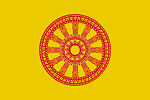
"Directives to Village Headmen Many leaflets are directives to village headmen, most of whom are fellow Muslims. Through 2007, roughly 11 percent of the victims of the insurgents had been village headmen or deputy headmen, making them one of the largest discernable groups of victims. The insurgents have been particularly interested in using the headmen to impose their agenda in the countryside.
Document 8
To the Village Headmen in ______ Village:
Please inform all Buddhist Thais and Muslim Thais in the area of your jurisdiction as follows:
- Buddhist Thais are strictly forbidden to hunt animals or make a living in the area regarded as Muslim land from now on, because the area belongs to the Muslim people. We would like to declare that from now on, the Buddhists there are deemed invaders and we are going to take back our land.
- The Buddhist Thais who work for the government and receive a salary from the owners of rubber plantations, and these owners who have employees and have shops, all of them have to pay a tax of Bt500 individually every month to Muslims. Payment must be paid to the mosque nearest to their house, every fifteenth of the month. Upon paying the amount, they must inform the head imam of the mosque that they want to donate money to support the Islamic religion. The people who have already paid money should tie a green cloth in front of their house to be a signal for the RKK [Runda Kumpulan Kecil] warriors so they will not hurt you.
- Everyone is forbidden to work on Friday. All sorts of work, whether trading, or rubber tapping, or clearing the land for planting [plantations]. And everyone is forbidden to drink alcoholic beverages on Fridays because the Prophet Muhammad designated Friday as the sacred day in commemoration of Allah. It is the duty of Muslims to produce as many children as possible. The Muslim who has four wives, must get another four wives. And everybody must take good care of their daughters, to observe their behavior so that they will get married as soon as possible so that they can produce children, who can help us take back our land.
Any household that has unmarried daughters, we the RKK warriors, regard as noncooperative and we will not guarantee their safety.
Please follow every instruction exactly.
— From the RKK Warriors of Pattani [ڤتنا]"
[Quelle: Abuza, Zachary: Conspiracy of silence : the insurgency in southern Thailand. -- Washington, DC : United States Institute of Peace Press, 2009. -- 293 S. ; 23 cm. -- ISBN 9781601270023. -- S. 244f. -- Fair use]
2007

Es erscheint
Thailand human development report, 2007 : sufficiency economy and human development / United Nations Development Programme (Thailand). -- Bangkok : United Nations Development Programme, 2007. -- Online: http://hdr.undp.org/sites/default/files/thailand_2007_en.pdf. -- Zugriff am 2014-11-04
Abb.: EinbandtitelVorwort von Ministerpräsident General Surayud Chulanont (พลเอก สุรยุทธ์ จุลานนท์, 1943 - ):
His Excellency General Surayud Chulanont (Ret.) "It is my pleasure and honour to introduce the Thailand Human Development Report 2007, with the theme of "Sufficiency Economy and Human Development".
Bestowed by His Majesty King Bhumibol Adulyadej [พระบาทสมเด็จพระปรมินทรมหาภูมิพลอดุลยเดช, 1927 - 2016 ] on the people of the Kingdom of Thailand ; the Sufficiency Economy philosophy [เศรษฐกิจพอเพียง] has now firmly taken root in Thai society. It has become the guiding philosophy for our country's development strategies and policies, including Thailand's 10th National Economic and Social Development Plan for 2007-2011. Indeed, it is the modus operandi for my Government's efforts to promote human development, reduce income inequalities, and ensure sound foundations for sustainable economic growth.
Gaining momentum in Thailand after the 1997 financial crisis, the Sufficiency Economy thinking has increased in importance over the years, right up to this year of political transition. The thinking advocates growth with economic stability over rapid but unbridled growth. It emphasizes sustainable development, sound macroeconomic policies, and the equitable sharing of the benefits of economic prosperity. At the same time, it shuns excessive risk-taking, untenable inequalities, and the wasteful use of natural resources.
At the community level, the Sufficiency Economy approach stresses the importance of "self-immunity" in other words, the need for communities to possess resilience against external or internal shocks, be they economic downturns, soaring fuel prices, natural disasters, ill health in families, or bad harvests.
At the national level, the idea of "self-immunity" is equally if not even more important. The Sufficiency Economy thinking helps us to build macroeconomic resilience to cope with the vagaries of the global economy and the negative effects of globalization.
The publication and dissemination of the Thailand Human Development Report 2007 is a timely and useful contribution to the ongoing debate about how to translate the Sufficiency Economy thinking into effective policies and concrete action plans to transform the way we tackle poverty, manage the economy, run businesses, and govern our country - for the ultimate benefit of the Thai people.
Just as important, this Report will help spread the message of the Sufficiency Economy beyond the borders of Thailand. During these times when the world is facing new challenges such as global warming and rapid globalization, the Sufficiency Economy philosophy - emphasizing moderation, responsible consumption, and resilience to external shocks - is of great relevance not only to Thailand but to countries and communities across the globe.
The Sufficiency Economy offers an effective approach to promoting sustainability and managing risks; a survival strategy for travelling down the fast-moving and sometimes treacherous road of globalization, with its illusions and pitfalls. In such a world, what could be more important than a good strategy?"

Die britische Zeitschrift The Economist kritisiert diesen Bericht am 2007-01-11:
"The sufficiency theory talks of "immunising" the national economy against shocks. So far the military government only seems to be creating shocks. As a result, growth is set to slow, and with it Thailand’s progress in cutting poverty. Neither the UNDP’s report, nor the many speeches launching it, discussed such awkward truths. The generals, having struggled to pin charges on Mr Thaksin [ทักษิณ ชินวัตร, 1949 - ], now want to airbrush him from public consciousness, to thwart any comeback. This week they told Thai broadcasters to stop quoting him. The autocratic businessman-turned-politician was careful to attach a personal brand to his popular policies. Many are now having the label removed: the 30-baht treatment fee is being dropped, so cheap or free health care can no longer be called by a name linked to Mr Thaksin. Overall, the generals want to overwrite his brand with the only stronger one in Thailand: the monarchy.
Perhaps it makes sense for the new government to obscure its predecessor’s achievements while stealing its best clothes. The question is why the UNDP thinks it should provide cover for this whitewash by puffing the sufficiency economy as a miracle-cure for the developing world’s woes. The answer is that the UNDP is a sucker for this sort of new-age waffle, especially if it has royal patronage. It has also lauded the not entirely dissimilar "Gross National Happiness" theory of Bhutan’s King Jigme Singye Wangchuk [1955 - ].
In publishing such an unbalanced report on a theory that is untried on a national level, the UNDP has abandoned all sense of objectivity. It is also lending legitimacy to a regime that took power by force. Hakan Bjorkman [Håkan Björkman], the UNDP’s deputy chief in Thailand, says it wanted to provoke a debate. But no such debate is possible in Thailand, because sufficiency theory is the king’s philosophy and anything remotely critical of it could be seen as lèse-majesté, punishable with jail."
.
2007
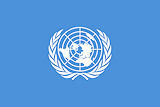
Es erscheint:
Safrole-rich Essential Oils : Risk of Illicit Use. -- In: Eastern Horizons. -- Summer - Autumn 2007. -- S. 9f. -- Online: https://www.unodc.org/documents/southeastasiaandpacific//Publications/eastern_horizons/EH26.pdf. -- Zugriff am 2016-04-118
Abb.: Strukturformel Safrol
"Safrole-rich Essential Oils - Risk of Illicit Use Certain plant species contain essential oils that are rich in safrole, a precursor chemical used in the manufacture of the illicit drug MDMA (Ecstasy). Although the region of East and South East Asia is a major producer of essential oils rich in safrole, very little information was available.
In 2005, "Project Prism" requested the United Nations Office on Drugs and Crime (UNODC) to conduct a survey of safrole-rich oils in East and South East Asia to obtain more information. Project Prism, initiated by the International Narcotics Control Board, aims at assisting governments in preventing diversion of precursor chemicals used in the illicit manufacture of
amphetaminetype stimulants (ATS) including MDMA.Due to the nature of the survey, it was conducted in collaboration with surveyors from the countries concerned and experts from the Forest Research Institute Malaysia (FRIM), a leading institution in the region focusing on tropical forestry research.
Financed by The Netherlands, the survey commenced with rapid appraisals in nine countries (Cambodia, China, Indonesia, Lao PDR, Malaysia, Myanmar, Papua New Guinea, Thailand and Viet Nam) followed by detailed surveys in six countries (Cambodia, China, Indonesia, Lao PDR, Thailand and Vietnam) in which the rapid appraisals revealed activities related to the production of safrole-rich oils and its trade. The six-month survey was completed in September 2006.
In the six countries surveyed, a total of 361 plants were found to contain essential oils rich in safrole. Most of the plants were of the Cinnamomum species. China has 26 species with safrole-rich oils of which six were used for oil extraction. The plants grow wild in natural forests except in China where these are also planted in a commercial scale, mainly in Sichuan and Guizhou provinces. Cinnamomum petrophilum was the preferred species for commercial cultivation as its leaves and branches could be harvested in a sustainable manner to extract the oils. In contrast, trees were felled in the other countries to extract the oils found mainly in the trunks and roots, thus destroying the trees and environment.
An analysis of 32 oil samples collected in the survey showed that the concentration of safrole in half the samples was 70 per cent and higher. The oil from the leaves of C. petrophilum in China contained 97 per cent safrole while oil samples from Cambodia and Indonesia had as much as 96 per cent and 93 per cent safrole, respectively. With such high concentrations of safrole, the oils could virtually be considered as safrole.
In Cambodia, the plant raw materials for oil processing were obtained mainly by felling trees with safrole-rich oils in natural forests to obtain the roots and trunk. In Indonesia villagers dug up the roots and stumps of such trees that had been previously felled for timber. In all the countries surveyed, the harvesting of non-timber forest products from natural forests required permission from the governments. In both Cambodia and Viet Nam, the harvesting of plant materials for the extraction of safrole-rich oils was prohibited by law. The plant raw materials were sold by villagers to the oil processing factories or via middlemen at US$25-35 per ton except in China where it was US$50-110 per ton.
The method to extract essential oils was by steam distillation. Wood from the roots, trunks and other tree parts was processed into wood chips which were steamed in a still. The steam distillation process required four major components, namely a boiler to generate steam, a still, condenser and collector. The large quantities of wood from the forests that were used to fuel the boilers, contributed very significantly to the destruction of the forest and environment.
The percentage yield of oil in the steam distillation process was between 1.2 and 3.5 per cent depending on the capacity of the distillation equipment used and the part of the plant and the plant species from which the raw material was obtained. In general, larger scale equipment gave better oil yields of above 2 per cent. The distillation plant in Palu, Indonesia, reported a high oil recovery of 2.5 to 3.5 per cent.
By extrapolating the information obtained from the survey, the annual production of safrole-rich oils in East and South East Asia was estimated to be 1360-1620 tons of which China accounted for 800 tons followed by Myanmar (230-490 tons), Cambodia (250 tons), Lao PDR (45 tons) and Indonesia (35 tons). The estimated amount would likely fluctuate widely in view of sporadic government operations in Cambodia to shut down production, varying demand for the oil in international markets and changing forest resources of safrole-rich oil trees.
The trade in safrole-rich oils is illegal in Cambodia. Trees containing the oils are considered rare species under the Forestry Law and therefore harvesting of the trees is prohibited. Illegal trade in the oil also occurred in Myanmar. In the other countries, safrole-rich oils were traded legally. Domestic trade in and use of safrole-rich oils were significant in China followed by Indonesia. China used an estimated 1500-2000 tons of the oil in 2006, mainly in the perfume processing industries while Indonesia used the oils as an ingredient in traditional medicinal oil. Domestic trade in Cambodia and Lao PDR involved small amounts of the oils for traditional medicines used by the local communities. Viet Nam was engaged in the import and export of oils only.
Smuggling of oils occurred from Cambodia to Viet Nam. Lao PDR exported the oils to both China and Viet Nam. Oils from Myanmar were mainly smuggled into China. Indonesia exported the oils to China and Japan while Viet Nam and China exported the oils worldwide. The average export price of safrole-rich oils was US$6 per kg. China used the following HS codes for safrole-rich oils: 3301299010 (sassafras oil), 2932940000 (safrole), 2932910000 (isosafrole) and 2932930000 (piperonal), whereas both Viet Nam and Indonesia used the general HS code for essential oils (330129990). In Cambodia, Lao PDR and Myanmar, trade in the oils did not pass through official border crossings and therefore, there were no HS codes for the oils.
Myanmar had seized about 115 tons during the period 2002-2005 while seizures in Cambodia were sporadic. There were no indications that the seized oils were intended for illicit drug manufacture.
Only China and Viet Nam have established specific regulations for the control of the production of and trade in safrole-rich oils. All the countries used forestry laws or administrative measures or both to control the harvesting of plant raw materials containing safrole-rich oils and the processing of and trade (export and import) in the oils which were considered as non-timber forest products.
A major outcome of the six-month survey was the sharp increase in awareness of government authorities with respect to the production and trade activities involving safrole-rich oils. In some cases, the survey findings were a revelation to the authorities. Consequently, the survey had generated a high level of interest in monitoring and controlling the production and trade activities.
Although these activities would likely be regulated in the near future through new legal or administrative measures, and hence reducing the risk of diversion into the black markets for illicit drug manufacture, the improved control and monitoring might result in at least a temporary decline in the availability of safrole-rich oils from the region. Nevertheless, a clearly visible observation of the survey was that the high level of sourcing of plants from natural forests for the extraction of safrole-rich oils was highly unsustainable, severely destructive of the environment and endangered the survival of the tree species.
For further information, contact Mr. Wong Hoy Yuen, Project Coordinator "Precursor Control in East Asia", Email: <HoyYuen.Wong@unodc.org>. "
[a.a.O. -- Fair use]
2007
Abb.: Putschist Prayut Chan-o-cha (ประยุทธ์ จันทร์โอชา), 2014-09-12
[Bildquelle: Prachatai. -- http://www.flickr.com/photos/prachatai/15034274598/. -- Zugriff am 2015-01-17. -- Creative Commons Lizenz (Namensnennung, keine kommerzielle Nutzung, keine Bearbeitung)]An dem National Defense College (วิทยาลัยป้องกันราชอาณาจักร) wird folgende Diplomarbeit abgeschlossen:
ประยุทธ์ จันทร์โอชา [Prayut Chan-o-cha] <1954 - >: กองทัพไทยเพื่อรองรับภัยคุกคามรูปแบบใหม่ = Roles and responsibilities reform of Royal Thai Armed Forces against the non-traditional treats. -- กรุงเทพฯ : วิทยาลัยป้องกันราชอาณาจักร, 2550.
Veröffentlicht 2551 [2008] als:
ประยุทธ์ จันทร์โอชา [Prayut Chan-o-cha] <1954 - >: กอง ทัพไทยกับภัยคุกคามรูปแบบใหม่ (Non-traditional threats) : การปรับบทบาทของกองทัพไทยเพื่อรองรับภัยคุกคามรูปแบบใหม่ในยุคโลกาภิวัตน์. -- กรุงเทพฯ : สมาคมรัฐศาสตร์ มหาวิทยาลัยเกษตรศาสตร์, 2551. -- 201 S. -- ISBN 9789745928107
Abb.: Einbandtitel
"Prayuth identified seven types of new threats the military needed to counter through "Military Operations Other Than War":
- security in the southern border provinces,
- international insurgency and transnational crime,
- drug trafficking,
- foreign labourers and illegal migrants,
- disasters resulting from climate change and disease,
- loss of natural resources, and
- poverty.
The first four comprised short-term threats, the fifth and sixth medium- term threats, and the last a long-term threat, and an underlying cause of some of the other threats.
This opens up a wide range of roles for the military.
Prayuth further argued that the military should play the role of mentor (philiang) [พี่เลี้ยง] to other institutions in countering such threats, working primarily through ISOC [Internal Security Operations Command - กองอำนวยการรักษาความมั่นคงภายในราชอาณาจักร - กอ.รมน.].
In addition to outlining the nature of non-traditional threats and the policies of recent Thai governments regarding those threats, Prayuth compares Thai, United States, Russian, and United Kingdom structures for countering non-traditional threats, in this way justifying the new roles of the military in the international context, and justifying it in line with powerful technologically advanced Western militaries rather than more similar nations.
In writing the report, Prayuth interviewed a range of top generals, including then army commander Anupong [Anupong Paochinda - อนุพงษ์ เผ่าจินดา, 1949 - ], indicating not only his leadership in this area, but also the emerging consensus among top generals around military operations other than warfare."
[Quelle: Ockey, James <1961 - >: Broken Power. -- In: "Good coup" gone bad : Thailand's political developments since Thaksin's downfall / ed by Pavin Chachavalpongpun [ปวิน ชัชวาลพงศ์พันธ์]. -- Singapore : Institute of Southeast Asian Studies, 2014. -- 290 S. ; 23 cm. -- ISBN 9789814459600. -- Konferenzband zu: Five years after the military coup : Thailand's political developments since Thaksin's downfall. -- Singapore 2011-09-19. -- S. 60]
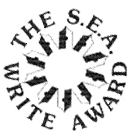
Montri Sriyong (มนตรี ศรียงค์ = กวีหมี่เป็ด, 1968 - ) erhält den Southeast Asian Writers Award für die Gedichtsammlung โลกในดวงตาข้าพเจ้า
Abb.: Einbandtitel einer der Ausgaben
Abb.: Montri Sriyong (มนตรี ศรียงค์)
[Bildquelel: Oaki / th.Wikipedia. -- GNU FDLicense]
2007
Es erscheint:
Chavoret Jaruboon [เชาวเรศน์ จารุบุณย์] <1948 - > ; Nicola Pierce: Memoirs of Thailand's last prison executioner. -- Dunboyne : Maverick House, 2007. -- 288 S. -- ISBN 978-1905379262
Abb.: Einbandtitel
2007

Phaidon Press (London) nennt Manit Sriwanichpoom (มานิต ศรีวานิชภูมิ, 1961 - ) als einen der 100 besten Photographen der Welt.
Abb.: Eines der werke von Manit Sriwanichpoom (มานิต ศรีวานิชภูมิ, 1961 - )
[Fair use]
2007
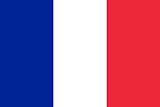
Der Photograph Dow Wasiksiri (ดาว วาสิกศิริ, 1956 - ) gewinnt einen Cannes Lions Prize.
Abb.: Werke von Dow Wasiksiri (ดาว วาสิกศิริ, 1956 - )
[Fair use]
2007
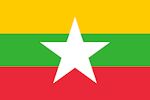
Nach Angaben des Arbeitsministeriums Myanmars arbeiten in Thailand eine halbe Million illegale birmanische Arbeitskräfte.
Abb.: Myanmar
[Bildquelle: CIA. -- Public domain]
2007

Im Hafen von Chiang Saen (เชียงแสน) laufen jährlich ca. 2500 Frachtschiffe ein, 90% davon kommen aus China.
Abb.: Lage von Chiang Saen (เชียงแสน)
[Bildquelle: OpenStreetMap. -- Creative Commons Lizenz (Namensnennung, share alike)]
Abb.: Chiang Saen (เชียงแสน)
[Bildquelle: Google earth. -- Zugriff am 2012-02-25]
Abb.: Chinesische Schiffe im Hafen von Chiang Saen (เชียงแสน), 2010-10
[Bildquelle: Wasin Waeosri. -- http://www.flickr.com/photos/plynoi/5556019064/ . -- Zugriff am 2012-02-25. -- Creative Commons Lizenz (Namensnennung, keine kommerzielle Nutzung)]
"Most of [the predominantly Chinese] ships dock for about two or three days. The ships often line up for almost half a kilometer in length. In the high season between July to August and the year’s end, one can see shipments of dried longans [Dimocarpus longan Lour.], the most famous [Thai] item that is exported to China. On average there are around six or seven ships per day loading these longans. For inbound cargo, in winter there will be up to fifteen ships per day carrying apples from China to Thailand. The [current] port is always congested with this traffic as there are limited docking areas available for all the ships." [Quelle: Thein Swe ; Chambers, Paul: Cashing in across the Golden Triangle : Thailands northern border trade with China, Laos and Myanmar. -- Chiang Mai : Mekong Press, 2011. -- 192 S. : Ill ; 22 cm. -- ISBN 978-616-90053-4-6. -- S. 94]
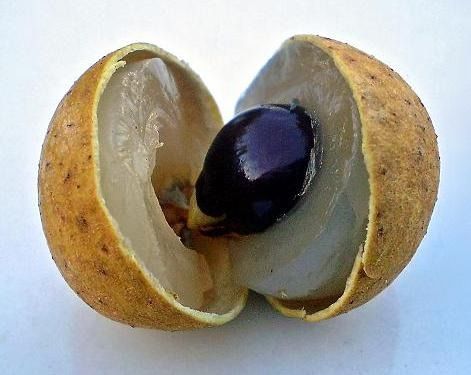
Abb.: Longan (Dimocarpus longan Lour., ลำไย)
[Bildquelle: (Nelson Ramos-Lopes / Wikimedia. -- Public domain]
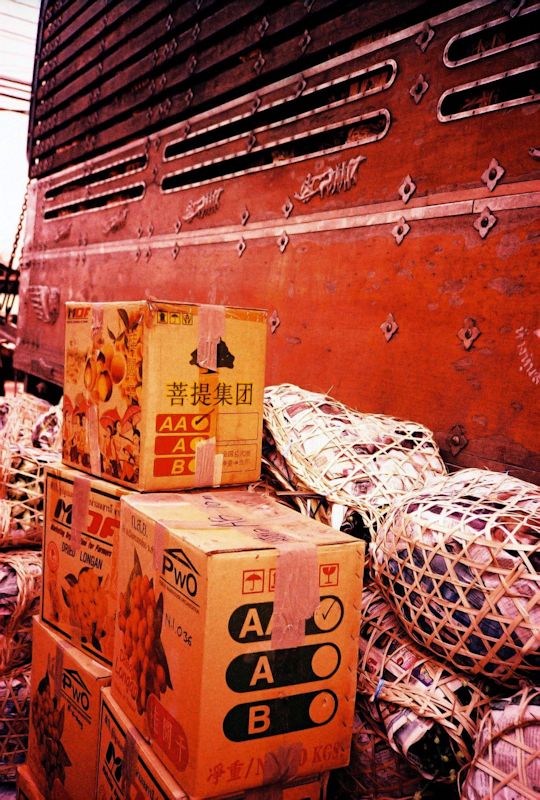
Abb.: Getrocknete Thai-Longans (Dimocarpus longan Lour., ลำไย / 龙眼) für
China (เชียงใหม่),
Chiang Mai, 2010
[Bildquelle: fups. --
http://www.flickr.com/photos/fups/4559686601/in/set-72157621786777946/ . --
Zugriff am 2012-02-25. --
Creative Commons
Lizenz (Namensnennung, keine kommerzielle Nutzung, keine Bearbeitung)]
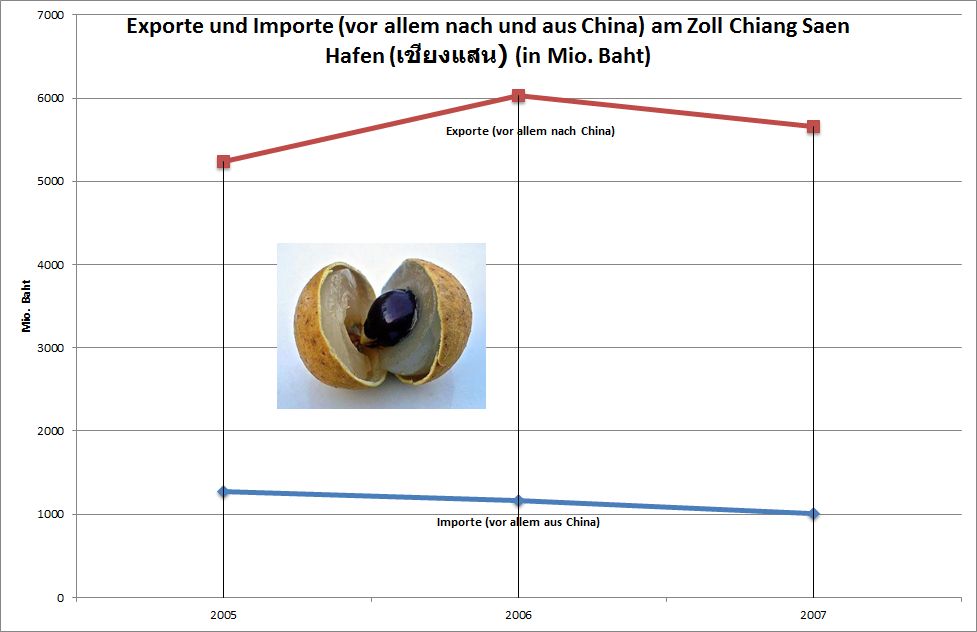
Abb.: Exporte und Importe (vor allem nach und aus China) am Zoll Chiang Saen
Hafen (เชียงแสน) (in Mio. Baht), 2005 - 2007
[Datenquelle: Thein / Chambers (2011), S. 96]
2007
Es kommen ca. 400.000 Touristen nach Thailand, um sich hier ärztlich behandeln zu lassen.
Abb.: "Thailand: Medical hub of Asia"
[Bildquelle: http://www.boi.go.th/tir/issue/201203_22_3/42.htm. -- Zugriff am 2014-09-24]
2007
Das Office of the Narcotics Control Board (ONCB) beginnt Alpha 6 Detektoren einzusetzen, um Drogen aufzuspüren.
"The Alpha 6 is a controversial "molecular detector" that is claimed to be able to detect from a distance various substances including explosives and drugs. The device has come under scrutiny following revelations about two similar devices, the ADE 651, which has become the focus of a fraud investigation in the United Kingdom,[1] and the GT200, which tests have determined to perform no better than random chance.[2] The UK Government has banned the export of such devices to Iraq and Afghanistan in an order brought into force in January 2010 under the Export Control Act 2002[3] and has warned foreign governments that the GT200 and ADE 651 are "wholly ineffective" at detecting bombs and explosives.[4] The government of Thailand, a major user of the Alpha 6, has ordered double blind testing of the device to determine whether it is effective.[5]
[...]
Controversy in ThailandThailand has been a major purchaser of the Alpha 6. The country's Interior Ministry has bought 479 of the devices and the Office of the Narcotics Control Board (ONCB), part of the Justice Ministry, has a further 15.[5] The ONCB began using the devices in 2007 to combat drug smuggling in northern Thailand and bought its units at a price of 400,000 baht ($12,000) apiece. It claimed that its Alpha 6 units were highly effective, achieving a 70% success rate and helping to identify drug traffickers and smuggled drugs.[12] The head of the OCNB, Police Lt General Krissana Phon-anan, has said that the devices work so well that the agency no longer uses dogs to detect narcotics. The Interior Ministry plans to procure more Alpha 6 devices and train 1,000 volunteers to use them.[5] Its own Alpha 6 devices were procured at a much higher price than those of the Narcotics Control Board, at 720,000 baht ($39,000) each.[13] The total cost of the devices has been around 351 million baht ($10.6 million).
Following a controversy about the effectiveness of the GT200 "remote substance detector", similar questions were raised about the Alpha 6. Thai Prime Minister Abhisit Vejjajiva (อภิสิทธิ์ เวชชาชีวะ, 1964 - ) ordered scientific tests of the GT200 in February 2010 to verify its claimed effectiveness. The tests found that the GT200's detection rate was no more effective than random chance.[2] In the wake of the GT200 scandal, the Science and Technology Ministry announced that it would broaden its tests at the request of the Interior and Justify Ministries to verify the claimed effectiveness of the Alpha 6.[14]"
[Quelle: http://en.wikipedia.org/wiki/Alpha_6 . -- ZUgriff am 2012-11-07]
2007

200 Schüler der Thewphaingarm School (, Bangkok, verkleiden sich als Nazis und marschieren an den Zuschauern mit "Sieg Heil" vorbei. Der Direktor der Schule sieht sich gezwungen, sich beim Simon-Wiesenthal Holocaust Museum, Los Angeles, zu entschuldigen.
2007
Im Fernsehen läuft die Soap Opera (ละคร)
เพลงรักริมฝั่งโขง (Love song by the rim of the Mekong)
Abb.: Plakat
2007
Miss Thailand Universe wird Farung Yuthithum (ฟ้ารุ่ง ยุติธรรม, nicknamed Kwang - กวาง, 1987 - ).
Abb.: Farung Yuthithum (ฟ้ารุ่ง ยุติธรรม), 2009
[Bildquelle: The Official Site of The Prime Minister of Thailand Photo by พีรพัฒน์ วิมลรังครัตน์. -- http://www.flickr.com/photos/40561337@N07/4184087688/ . -- Zugriff am 2011-11-30. -- Creative Commons Lizenz (Namensnennung)]
2007
Miss Thailand World wird Kanokkorn Jaicheun (กนกกร ใจชื่น, nicknamed Som - ส้ม, 1986 - )
Abb.: Kanokkorn Jaicheun (กนกกร ใจชื่น), 2007
[Bildquelle: Rosengurtt / Wikipedia. -- GNU FDLicense]
2007
Miss Thailand Earth wird Jiraporn Sing-ieam (จิราภรณ์ สิงห์เอี่ยม)
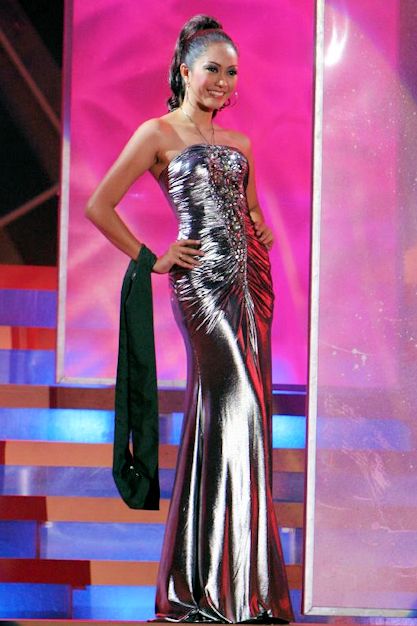
Abb.:
Jiraporn Sing-ieam (จิราภรณ์ สิงห์เอี่ยม), 2007
[Bildquelle: Paul Chin. --
http://www.flickr.com/photos/pchin/2043753268/.
-- Zugriff am 2013-04-21. --
Creative Commons
Lizenz (Namensnennung, share alike)]
2007
Teenie-Ideal Saowalak Duangsong (เสาวลักษณ์ ด้วงทรง):
Abb.: Saowalak Duangsong (เสาวลักษณ์ ด้วงทรง)
[Bildquelle: YURiN / Wikimedia. -- GNU FDLicense]
2007
Die Musikgruppe Pong Lang Sa On (โปงลางสะออน) ist äußerst erfolgreich: 500.000 mal wird 2007 ihr erstes Album verkauft, ihre Konzert-Videos über 1 Million mal.
Abb.: Pong Lang Sa On (โปงลางสะออน), Trang (ตรัง), 2008
[Bildquelle: 2T / Wikipedia. -- GNU FDLicense]
Abb.: Lage von Trang (ตรัง)
[Bildquelle: OpenStreetMap. -- Creative Commons Lizenz (Namensnennung, share alike)]Mitglieder der Gruppe:
- "Ead" Sompong Kunaprathom (อี๊ด สมพงษ์ คุนาประถม)
- "Lala" Khuwnapa Ruangsri (ลาล่า ขวัญนภา เรืองศรี)
- "Lulu" Duangrudee Boonbumrung (ลูลู่ ดวงฤดี บุญบำรุง)
"Pong Lang Sa On (Thai: โปงลางสะออน) is a band from Thailand, founded in 2005. Their career was helped, by winning a talent contest on TV, in Thailand. Their style of music can be referred to, as folk music from Thailand, with a strong influence of pop and rock.
On stage, the musicians perform together with no less than ten dancers. These dancers are also specialists, in folk dance from Thailand. The front man, goes by the name Eed (อี๊ด). Next to him, when he performs on stage, are two humorous ladies, referred to as La-la (ลาล่า) and Lu-lu (ลูลู่).
Last year, they toured in the U.S.A. A tour of Europe, will commence 27. August 2008.
Biography
Pong Lang Sa On is a band group from Isaan (อีสาน), Northern East region of Thailand, founded in 2005. Their career was started when they won a talent contest on TV. Their style of music is based on a folk music , with a strong influence of pop and rock. They held tour in the U.S.A and tour event in Europe in August 2008.
Pong Lang Sa On is performing on stage rather than holding a live event. The stage is like a comedy show with traditional music goes along. Dancing, singing, performing and live comedy talking show opened their careers. Now, they are the leading group of “comedian’s” band group."
[Quelle: http://en.wikipedia.org/wiki/Pong_lang_sa_on . -- Zugriff am 2012-01-11]
2007
Gründung des Mädchen-Pop-Trios FFK (เฟย์ ฟาง แก้ว).

Abb.: FFK
(เฟย์ ฟาง แก้ว), 2008
[Bildquelle: Lerdsuwa / th.Wikipedia. -- GNU FDLicense]
|
"FFK (เฟย์ ฟาง แก้ว) is a Thai pop trio girl group consisting of Faye (เฟย์), Fang (ฟาง) and Kaew (แก้ว) formed in 2007, affiliated with Kamikaze music, sublabel of RS music company. They are the first artist of this teenager-hit music label, represent 3 styles of girls in this generation: fashionista, sweety and cool, different but perfect ingredient. FFK released many of hit string songs that have topped on the Thai radio charts. Many impressive shows and performances on the stages, lovely personalities and looks in front or behind the scenes make them become one of popular girl groups or idols in this ages. In addition to the music, they are also in other roles, MC's on TV Programs: Kamikaze Club and FFK OPEN WORLD, or actress on Thai drama&movies. However they still love to perform as an artist on the musical routes and frequently participate in some special projects of Kamikaze,Faye in Seven Days and Fang&Kaew in Loveเว่อร์ Project. FFK call their fanclub's name as TOY, derived from the song: Baby Boy. In this song has lyrics "Baby Boy,I'm not your toy" but fanclub said that they submitted to be FFK's TOY. Even though TOY has a meaning of missing(Thinking of You). MembersPornpawee "Faye" Neerasingh (พรปวีณ์ นีระสิงห์) born on December 29, 1992. Dhanundhorn "Fang" Neerasingh (ธนันต์ธรญ์ นีระสิงห์) born on September 12, 1991. Jarinya "Kaew" Sirimongkolsakul (จริญญา ศิริมงคลสกุล) born on June 22, 1992. [Quelle: http://en.wikipedia.org/wiki/Faye_Fang_Kaew. -- Zugriff am 2013-04-09. -- Original Thai-Englisch] |
2007
Gründung der Pop-Band August Band (The August) (ออกัส).
Die Gruppe auf Spotify:
URI:
spotify:artist:2shnlw6aBILzO1dCploE2T
URL:
https://open.spotify.com/artist/2shnlw6aBILzO1dCploE2T
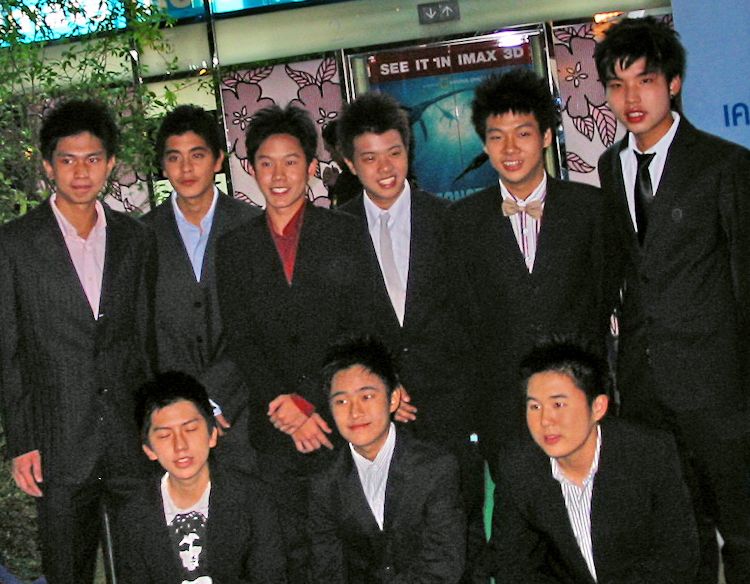
Abb.: August
Band (ออกัส), 2007
[Bildquelle: Sry85 / Wikipedia. -- GNU FDLicense]
|
"August Band (The August) (Thai: ออกัส ) is a Thai boy band that consists eleven members. They were discovered at the movie The Love of Siam (รักแห่งสยาม, 2007, a Thai romantic-drama film written and directed by Chookiat Sakveerakul - ชูเกียรติ ศักดิ์วีระกุล). Originally, the band was made for the movie but, they found themselves comfortable with each other so decided to pursue it into the Thai Entertainment Industry. At first, band was consisted by Pchy (พิช), Non (นน), Nine (นายน์), Tor (ต่อ), Em (เอ็ม), Wan (แวน), Arm (อาม), Mike (ไมค์), Ong (อ๋อง), Mac (แมค), and Petch (เพชร). Eventually, their managers added up Goo (กู๋), Joker (โจ๊กเกอร์), Taw (ตาว) and summing up a total number of fourteen members. Hence, two of the original members namely Em and Mike withdrew due to personal issues and Goo (who was by then replaced by Tle - เติ้ล) also left because of controversies. Recently, Joker had left the band to concentrate on his studies." [Quelle: http://en.wikipedia.org/wiki/August_Band. -- Zugriff am 2013-03-09] |
2007
Es erscheint der Gelbhemden-Song:
แสง ธรรมดา [Saeng Thammada] <1954 - >: หยิกทักษิณ [Kneife Thaksin]
2007
Nachdem sich der Sänger สายัณห์ สัญญา [Sayan Sanya, 1953 - 2013] kritisch über den Putsch von 2066 geäussert hat, verbietet das Public Relations Department sein neuestes Album.Künstlerlink auf Spotify:
URI: spotify:artist:1GCx5UwACFSoOeqlEsxdl9
URL: https://open.spotify.com/artist/1GCx5UwACFSoOeqlEsxdl9
Abb.: Cover
[Fair use]
2007
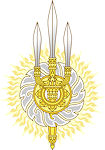
Naowarat Pongpaiboon (เนาวรัตน์ พงษ์ไพบูลย์, 1940 - ) schreibt einen neuen Text für den Song Mahachai (เพลงมหาชัย). Der Song wurde ursprünglich von Prinz Paribatra Sukhumbhand (สมเด็จพระเจ้าบรมวงศ์เธอ เจ้าฟ้าบริพัตรสุขุมพันธุ์ กรมพระนครสวรรค์วรพินิต, 1881 - 1944) komponiert und wird jetzt mit Prinzessin Sirindhorn (มหาจักรีสิรินธร, 1955 - ) in Verbindung gebracht.
Text der Neufassung:
ขอชัยมงคล โปรดจงอยู่ดำรง คงยิ่งใหญ่ในแผ่นดิน ภูมิพื้นถิ่น ภูมิพลัง ไทยทุกเหล่า เผ่าสยาม ชยะสิทธิ์ สิทธิ์ชัย ทุกยาม ชยะศักดิ์สยามยืนยง สิ่งประสงค์จงเจริญ ผองไทยรักแผ่นดินไทย รวมใจร่วมฝ่าเผชิญ เดินสู่สมัยไทยสากล บนแผ่นดินถิ่นสยาม ชยะสิทธิ์ สิทธิ์ชัย ทุกยาม ชยะศักดิ์สยามยืนยง ขอมงคลมหาชัย ชโย Quelle: https://th.wikipedia.org/wiki/เพลงมหาชัย/. -- Zugriff am 2016-01-17. -- Fair use]
2007
Filme mit dem größten Umsatz (Kassenschlager)
| 1 | Tamnaan somdet phra Naresuan maharat ( Phaak prakaat itsaraphaap - ตำนานสมเด็จพระนเรศวรมหาราช ภาค ๒ ประกาศอิสรภาพ (Declaration of Independence)) | $7,2 Mio. |
| 2 | Naresuan (ตำนานสมเด็จพระนเรศวรมหาราช - King Naresuan) | $7,1 Mio. |
| 3 | Spider-Man 3 | $6,1 Mio. |
| 4 | Harry Potter and the Order of the Phoenix | $5,7 Mio. |
| 5 | Pirates of the Caribbean: At World's End | $4,5 Mio. |
[Datenquelle: Box Office Mojo]
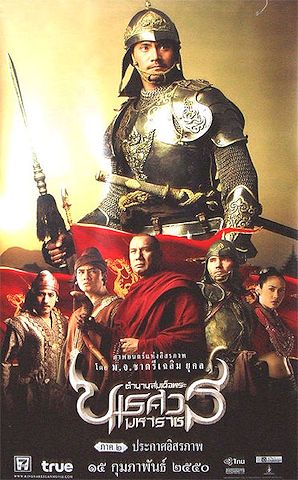 1. Platz |
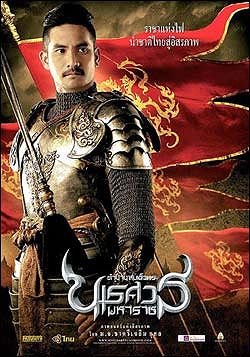 2. Platz |
 3. Platz |
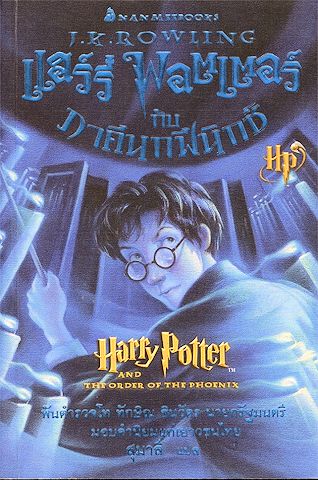 4. Platz |
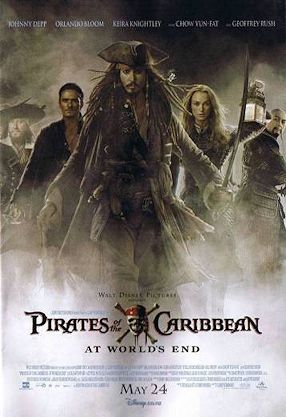 5. Platz |
Kassenschlager [Quelle aller Bilder: th.Wikipedia. -- Fair use] |
2007
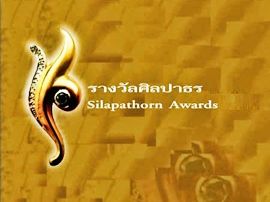
Den Silpathorn Award (รางวัลศิลปาธร) erhalten:
- Visual Arts: Pinaree Sanpitak (พินรี สัณฑ์พิทักษ์)
- Visual Arts: Vasan Sitthiket (วสันต์ สิทธิเขตต์, 1957 - )
- Visual Arts: Rirkrit Tiravanija (ฤกษ์ฤทธิ์ ตีระวนิช, 1961 - )
- Literature: Siriworn Kaewkan (ศิริวร แก้วกาญจน์, 1968 - )
- Music: Narong Prangcharoen (ณรงค์ ปรางค์เจริญ)
- Film: Thunska Pansittivorakul (ธัญสก พันสิทธิวรกุล, 1973 - )
- Performing Arts: Nimit Pipithkul (นิมิตร พิพิธกุล), Puppenspieler
Abb.: Plakat für eine Ausstellung von Pinaree Sanpitak (พินรี สัณฑ์พิทักษ์)
[Fair use]
Abb.: Einbandtitel eines Buchs von Vasan Sitthiket (วสันต์ สิทธิเขตต์)
[Fair use]
Abb.: Plakat eines Films von Rirkrit Tiravanija (ฤกษ์ฤทธิ์ ตีระวนิช)
[Fair use]
Abb.: Einbandtitel eines Buchs von Siriworn Kaewkan (ศิริวร แก้วกาญจน์)
[Fair use]
Abb.: Plakat für Musik von Narong Prangcharoen (ณรงค์ ปรางค์เจริญ)
[Fair use]
Abb.: Plakat für Kurzfilme von Thunska Pansittivorakul (ธัญสก พันสิทธิวรกุล)
[Fair use]
Abb.: Plakat für eine Vorführung mit Nimit Pipithkul (นิมิตร พิพิธกุล)
[Fair use]
2007

Das National Buddhism Bureau, das buddhistische Institutionen und Funktionäre subventioniert, erhält vom Staat 3 Milliarden Baht für 2007.
2007
Es erscheint:
Ungpakorn, Giles Ji [ใจ อึ๊งภากรณ์] <1953 - >: A coup for the rich : Thailand's political crisis. -- -- [Bangkok] : Workers Democracy Publishing, 2007. -- 144 S.
Abb.: Titelblatt
"Giles Ji Ungpakorn (Thai: ใจ อึ๊งภากรณ์, pronounced [d͡ʒai ʔɯ́ŋpʰāːkōn] RTGS: Chai Uengphakon, born 1953, is a Thai-British academic and political activist. He formerly worked as an associate professor at Faculty of Political Science, Chulalongkorn University (จุฬาลงกรณ์มหาวิทยาลัย), before he fled to the United Kingdom after facing a lèse majesté (ความผิดต่อองค์พระมหากษัตริย์ไทย) charge in Thailand. Early life and education
Giles Ji Ungpakorn is the youngest son of former Bank of Thailand (ธนาคารแห่งประเทศไทย) governor and Thammasat University (มหาวิทยาลัยธรรมศาสตร์) rector Puey Ungpakorn (Thai: ป๋วย อึ๊งภากรณ์, RTGS: Puai Uengphakon, 1916 - 1999), and his wife Margaret Smith of London,[1] and holds both Thai and British citizenship.[2] He has two older brothers, Jon Ungpakorn (จอน อึ๊งภากรณ์, 1947 - ) and Peter Ungpakorn. Giles Ungpakorn was educated in England at Sussex and Durham Universities and the School of Oriental and African Studies, University of London before returning to Thailand in 1997.
Political roleIn 2006, after the military staged a coup and revoked the constitution, Giles led a demonstration in downtown Bangkok by university students.[3] He was later accused of lèse majesté for writing a book called A Coup for the Rich, where he argued that the coup was illegitimate and supported by the King. Ungpakorn is widely known an activist with the socialist Turn Left Thailand group.
In February 2007, his English-language academic work A Coup for the Rich was refused distribution by the bookstore of Chulalongkorn University. His listing the controversial The King Never Smiles, which he has reviewed and criticised, as a reference was the explanation given by the store manager.[4]
Giles Ungpakorn was formally charged with lese majeste in Bangkok, Thailand on January 20, 2009. He had 20 days to respond to the charges, after which the Thai authorities would decide whether his case would be given to the Thai courts for prosecution. Ungpakorn said he was being charged because of the contents of his book A Coup for the Rich, which points out the main reasons the coup in Thailand two years ago took place. He fled Thailand in February 2009, returning to the United Kingdom. He stated: "I did not believe I would receive a fair trial."[5]
Giles Ungpakorn is a self-declared republican and a vocal opponent of the Thai monarchy and the military.[6] While fleeing Thailand, he wrote Red Siam Manifesto, which explicitly criticised King Bhumibol Adulyadej.[7] He has criticised King Bhumibol for being a "weak, unprincipled" monarch who has never supported democracy, and holds the army, the elites and the king responsible for supporting the Thammasat University Massacre of 1976 (เหตุการณ์ 6 ตุลา).[8][9][10] He has also fiercely denounced the king's much-touted sufficiency economy principles (เศรษฐกิจพอเพียง), branding it an arrogant commandment for the poor to know their place, given that the King is the richest Monarch in the world.[11] He also declares himself a Marxist.[12] He is a member of the Thai socialist group Turn Left, which is part of the Trotskyist International Socialist Tendency. Giles is also a Red Shirt (แนวร่วมประชาธิปไตยต่อต้านเผด็จการแห่งชาติ) and member of Kon Thai UK, a Red Shirt organisation in the U.K.
In an opinion piece written for the Asia Sentinel website he has discounted the prospects of a successful social and political reform, and has aligned himself with those who are calling for a social revolution to occur in Thailand.[13] Giles has also criticised those who advocate armed struggle.
His latest English language book: "Thailand's Crisis and the Fight for Democracy", published in early 2010, is Giles' attempt to explain the present situation in Thailand before the Red Shirt demonstrations and clashes with the military in April and May 2010."
2007

Viele Eigenheimbesitzer in den USA können ihre Kredite nicht zurückzahlen, das führt zu einer weltweiten Finanzkrise.
Abb.: Inoffizieller Ausweis für Investmentbanker
[Bildquelle: DonkeyHotey. -- http://www.flickr.com/photos/donkeyhotey/6510797215/in/photostream/ . -- Zugriff am 2012-02-20. -- Creative Commons Lizenz (Namensnennung)]
"Die Finanzkrise ab 2007 ist eine Bankenkrise, Finanzkrise und Wirtschaftskrise, die im Frühjahr 2007 mit der US-Immobilienkrise (auch Subprimekrise) begann. Die Krise war unter anderem Folge eines spekulativ aufgeblähten Wirtschaftswachstums in den USA und einer weltweiten kreditfinanzierten Massenspekulation. Die Krise äußerte sich weltweit zunächst in Verlusten und Insolvenzen bei Unternehmen der Finanzbranche. Ihren vorläufigen Höhepunkt hatte die Krise im Zusammenbruch der US-amerikanischen Großbank Lehman Brothers im September 2008. Die Finanzkrise veranlasste mehrere Staaten, große Finanzdienstleister (unter anderem American International Group, Fannie Mae, Freddie Mac, UBS und die Commerzbank) durch staatliche Fremdkapital- und Eigenkapitalspritzen am Leben zu erhalten.
Die Krise übertrug sich in der Folge in Produktionssenkungen und Unternehmenszusammenbrüchen auf die Realwirtschaft. Viele Unternehmen, wie der Autohersteller General Motors, meldeten Konkurs an und entließen Mitarbeiter. Die ohnehin hohe Staatsverschuldung vieler Staaten stieg krisenbedingt stark an.I
Übersicht über die Entstehung der US-Immobilienkrise und ihre Auswirkungen
Platzen der Dotcom-Spekulationsblase im Jahr 2000. Viele US-Aktien stürzen ab. Geld wird dem Aktienmarkt entzogen.
Die US-Zentralbank reagiert auf die Krise und vergibt Geld an US-Banken zu sehr niedrigen Zinsraten, um Liquidität in die Finanzmärkte zu bringen. Nach dem Einbruch des Aktienmarktes wird nach neuen Anlagemöglichkeiten gesucht.
Das billige Geld der US-Zentralbank führt zur Ausweitung der Kreditgewährung von Banken auch an Darlehensnehmer mit immer geringerer Bonität ("Subprime-Kredite"). Kontrolle der Kreditwürdigkeit schwindet. US-Banken vergeben Verbrauchern Kreditkarten mit Niedrigzinskonditionen.
Boom-Phase des US-Immobilienmarktes. Häuserkauf und Konsum von US-Bürgern auf Kreditbasis. Bildung einer Immobilienpreisspirale. Das Kreditrisiko der US-Banken wird zunehmend an Dritte (auch ausländische Anleger) ausgelagert über Mortgage Backed Securities (MBS) und Collateralized Mortgage Obligations (CMOs).
Platzen der kreditinduzierten Immobilienblase im Jahr 2007. US-Bürgern fällt es schwer, ihre Kredite zu bedienen oder zurückzuzahlen. Zahlungsausfälle und Zahlungsstörungen im US-amerikanischen Hypothekenmarkt, insbesondere im Subprime-Segment.
Verluste und negative Ratingänderungen von forderungsbesicherten Wertpapieren und ABCP.
Illiquidität von ABCPs und forderungsbesicherten Wertpapieren sowie Ausweitung der Risikoaversion von Investoren gegenüber kreditrisikobehafteten Anlageinstrumenten.
Insolvenz der Investmentbank Lehman Brothers. Kurseinbrüche an den Börsen. Vertrauenskrise im Interbankenmarkt, Geldmarktliquiditätsengpässe.
Refinanzierungsprobleme von Banken und hohe Neubewertungsverluste von kreditrisikobehafteten Anlageinstrumenten. Insolvenzen u. a. der Washington Mutual und Kaupthing Bank.
Rezession mit Arbeitsplatzabbau in Unternehmen; Unternehmensinsolvenzen durch sinkende Kreditvergabe für kreditrisikobehaftete Anlagen und wegen Deleveraging seitens der Banken.
Arbeitslosigkeit in den Vereinigten Staaten erreicht höchsten Stand seit vierzig Jahren seit Beginn der statistischen Erfassung 1967.[3]
Die US-Zentralbank vergibt Geld zu sehr niedrigen Zinsraten. Banken melden hohe Gewinne[4]. Nach der US-Immobilienkrise entwickelten sich dann die Staatsschuldenkrisen im Euroraum. Eine befürchtete Währungskrise in der Eurozone hat sich jedoch nicht eingestellt. (Stand Dezember 2011)[5] [Quelle: http://de.wikipedia.org/wiki/Finanzkrise_2007 . -- Zugriff am 2012-01-04]
2007

Die Zahl der Flüchtlinge aus Nordkorea nimmt zu. Nordkoreaner fliehen nach China und werden dann über Laos nach Chiang Rai (เชียงราย) geschleust. Die Schleuser verlangen dafür 1 bis 1,5 Mio. Baht. Von Thailand gehen die Flüchtlinge nach Südkorea oder in ein Drittland.
Abb.: Nordkorea - China - Laos - Chiang Rai (เชียงราย)
[Bildquelle: CIA. -- Public domain]
2007

In Frankreich erscheint das erste Heft der Comic Serie Apai Quest. Es ist der erste Thai-Comic, der im Ausland in Übersetzung publiziert wird. Apai Quest ist die französische Fassung von Apaimanee Saga (อภัยมณี ซาก้า).
Abb.: Einbandtitel
2007


Prinzessin Galyani Vadhana (ศาสตราจารย์ (พิเศษ) พลเอกหญิง พลเรือเอกหญิง พลอากาศเอกหญิง สมเด็จพระเจ้าพี่นางเธอ เจ้าฟ้ากัลยาณิวัฒนา กรมหลวงนราธิวาสราชนครินทร์. 1923 - 2008) wird von der französischen Regierung zum Grand officier de la Légion d'honneur ernannt. Diese Auszeichnung gilt ihren Verdiensten um die Verbreitung der französischen Sprache.
Abb.: Plakette des Grand officier de la Légion d'honneur
[Bildquelle: Arnauddevial / Wikimedia. -- Creative Commons Lizenz (Namensnennung, share alike)]
2007
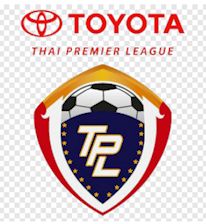
Sieger in der Thai Premier League (ไทยพรีเมียร์ลีก) (Fußball): Chonburi F. C. (สโมสรฟุตบอลชลบุรี)
Abb.: ®Logo
[Bildquelle: Wikipedia]
2007
Architektin Kanika R'kul [= Ratanapridakul] (กรรณิการ์ รัตนปรีดากุล) von Spacetime Architects: Fertigstellung des Hauses:
DKFF House, Bangkok
2007
Architekt Bundit Kanisthakhon (บัณฑิต กนิษฐคนธ์) von Tadpole Studio: Fertigstellung des Hauses
Harirak House, Bangkok
2007
Briefmarken:
ausführlich: http://www.payer.de/thailandchronik/ressourcen.htm
Zu Chronik 2007 / B. E. 2550. -- 2. Januar bis Juni